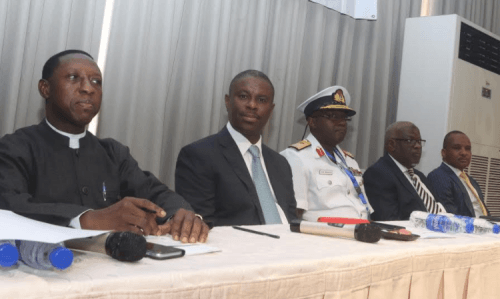
The Federal Government has embarked on measures to ensure a smooth enforcement of the newly enacted anti-piracy law as part of efforts to stem criminality on Nigerian waters.
This was revealed in Lagos at the annual Strategic Admiralty Law Seminar for Judges put together by the Nigerian Institute of Advanced Legal Studies (NIALS) and the Nigerian Maritime Administration and Safety Agency (NIMASA).
The theme of the conference was “Suppression of Piracy and Other Maritime Offences (SPOMO) Act, 2019: Key to Accelerating and Achieving Safe and Secure Shipping in Nigeria.” it was meant to sensitise judicial sector actors on the import of the antipiracy law.
Speaking at the opening ceremony, the Directors-General of NIMASA and NIALS, Dr. Dakuku Peterside and Professor Mohammed Tawfiq Ladan, respectively, emphasised the need for unencumbered implementation of the law.
They called for cooperation among the enforcement agencies, stressing that stringent penalties await maritime criminals in the country.
Dakuku noted that there was now a robust framework for the criminalisation and punishment of piracy and other maritime crimes in Nigeria and the Gulf of Guinea. He said the seminar afforded the Judiciary and the Agency a unique opportunity to dialogue on issues of mutual importance, particularly, the sensitisation of judges on contemporary maritime law issues both within and outside the Nigerian jurisdiction.
The seminar was previously meant for judges of the Federal High Court, Court of Appeal, and High Courts of the littoral states. But this year, the scope of participation was further enlarged to include law enforcement agencies.
Dakuku said, “With the world’s waters accounting for over 80 per cent of transportation requirements in the global trading supply chain network across established international routes and trade lanes, the threats of piracy, armed robbery at sea and other maritime crimes have been an issue of global concern.
“The Gulf of Guinea, sadly, had been at the epicentre of maritime security discussions globally, given the incidents recorded in the region. The challenge of maritime insecurity in the region had been further compounded by a deficit of legislation to address the challenge.”
He said the SPOMO Act had addressed that challenge.
On his part, the Director-General of NIALS, Ladan, said with the Nigerian economy generating more than 70 per cent of seaborne trade in West Africa, the country and region will prosper if the seas were safe for investment and commerce.
President Muhammadu Buhari had signed the SPOMO Act into law on June 24, 2019. The law aims to tackle the menace of piracy and armed robbery on the country’s waters and exclusive economic zone with a strong and specific legal instrument that prescribes punishment for offenders and deters criminal elements. It is the first standalone antipiracy law in the Gulf of Guinea region.
The Act prescribes jail terms of between 15 years and life, and fines from N50 million to N500 million for individuals and corporate organisations convicted for maritime offences.
